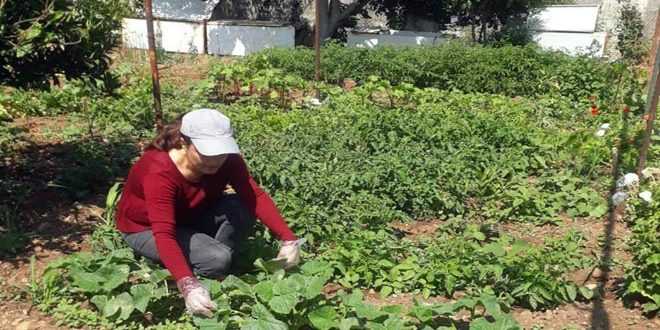Homs, (ST) – Driven by her love for the land, her passion for agriculture and her desire to achieve self-sufficiency for her family, Mrs. Mahasin Ibrahim, after nearly five years of research and exerted effort, succeeded in establishing a project for producing organic fertilizer, “worm castings or vermicast”, in her land in the village of Al-Suwayri in the western Homs countryside.
In a statement to SANA reporter, Ibrahim indicated that she suffered and struggled a lot to secure the livelihood of her family, as she is the wife of a martyr. Therefore, she looked for a successful way to cultivate the land around her home in the village and produce her family’s food. Unfortunately, the soil of her land lacked the necessary nutrients, and since she did not like the chemical fertilization method, she started searching online for the best natural fertilization methods. She met a farmer from Ghouta, Damascus countryside, who brought her compost worms to produce natural fertilizer for crops. Thus, the idea grew inside her mind to establish a project for producing compost worms, or what is known as “vermicomposting.”
She pointed out that she had obtained adequate information about organic fertilizers from specialized websites. Thus, she began her journey with experimentation, where she found promising results after several experiments that lasted for months and years of work, indicating that she currently has two basins and abundant quantities of worm fertilizer.
She explained that the production and reproduction of worm fertilizer requires conditions such as moderate temperature and certain humidity. It passes through several stages to be added to the soil in a step to be planted, as the cultivated seed gives abundant production, early flowering and fruiting and can give the land full nutrients through the bacteria found in it.
Ibrahim mentioned that the more worms grow the more fertilizer they give. It is not necessary to work on such a project for more than two days a week with daily monitoring. It requires chlorine-free water and no insect is allowed to enter the soil of the worm compost, indicating that it can be used in all types of agriculture in the countryside and the city, such as planting roses, rooftops, gardens, and others.
She pointed out that she distributed some quantities of her products to a number of villagers to prove the success of her project. Several agricultural engineers and some students of the Faculty of Agriculture were briefed on her project, which they considered a research area for their graduation projects.
Mahasin Ibrahim is still communicating with many agricultural and horticultural experts in the Arab countries with the aim of conducting scientific dialogues and exchanging expertise and pioneering experiences in the field of natural fertilizer production.
Amal Farhat

